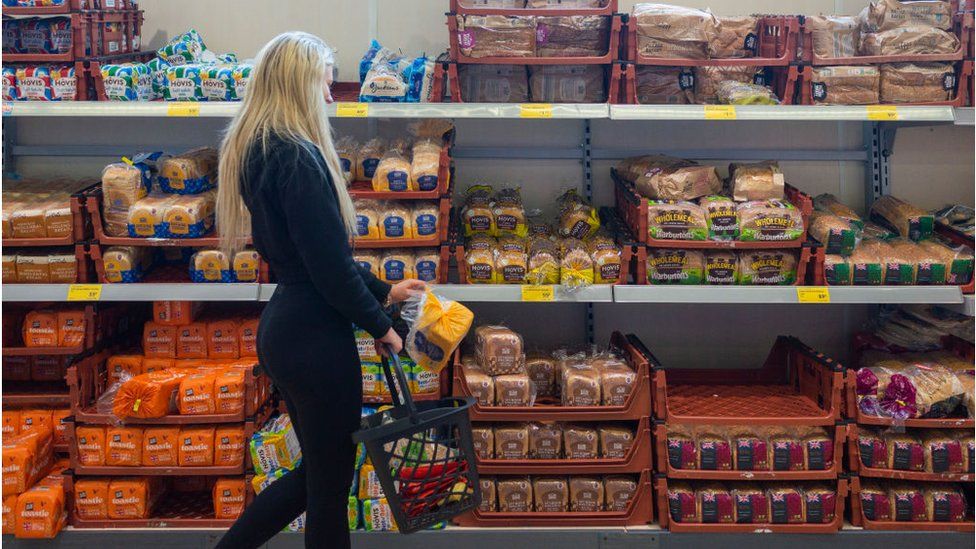Warning food prices to rise quickly over summer
- Published
- comments

Food prices will rise quickly this summer due to soaring costs, grocery analysts have predicted.
Prices will rise at a rate of 15% as households pay more for staples such as bread, meat, dairy and fruit and vegetables, the Institute of Grocery Distribution (IGD) said.
More vulnerable people will skip meals, it warned.
It also predicted that prices would rise faster for longer than Bank of England estimates.
The IGD, which provides analysis to major grocers, said the UK was facing the highest cost of living pressures since the 1970s, mainly down to the Ukraine war.
Both Ukraine and Russia are major global grain producers - the countries together account for nearly a third of global wheat exports.
So Russia's invasion of Ukraine is pushing up grain prices as countries around the world scramble for the produce.
Products that use grains directly, such as bread, and products made of animals that are fed on grain, such as chicken, will rise quickly in price in the summer or autumn, IGD said.
Chickens grow quickly, so it will only take weeks for animal-feed price rises to be felt by consumers.
The squeeze on fuel and energy costs will also push food prices higher, because a lot of agriculture is very energy intensive, it said. Fertiliser prices have also nearly tripled since last year.
A lot of foil and wood pulp normally come from Russia, and the war has driven up packaging prices of those materials. Plastic packaging, which is made from oil, is also more expensive.
Ukrainian roads, ports and warehouses have been heavily damaged in the war, and so the volume of exports will be reduced "for years to come" IGD said, putting pressure on supplies of sunflower oil and wheat.
The UK also faces particular problems, it said. Two-thirds of the people on the Seasonal Agricultural Workers scheme were from Ukraine last year, but this year, Ukrainian men between 18 and 60-years-old have been told to stay at home and fight.
Gaps are being plugged by workers from further afield, but the new workers need training, and those costs will feed into price rises, IGD said.
The UK gets about 40% of its food from outside the country, so it is exposed to global food price rises.
And since Brexit, European Union producers are less likely to prioritise UK customers, it said.
The Bank of England expects inflation to fall back next year, but IGD said higher inflation could last longer if there are more food export bans or more trade disruption due to new Brexit border arrangements in 2023.
Skipping meals
The rise in food prices will hit vulnerable families the hardest, IGD chief economist James Walton said.
"Sadly, many households in the UK struggled with food bills before the current inflation event began," he said.
"With prices for energy, motor fuel and food rising fast, more households are moving into this vulnerable group."
He said that IGD research had found shoppers increasingly reporting skipping meals, "especially when there are children in the household".
Mr Walton expected shoppers in general to make money-saving changes to behaviour including eating out less and more at home, planning their menus ahead of time and making fewer spontaneous buys, cooking from scratch and eating up leftovers, shopping around and splitting shops between retailers, and switching from named brands to own-label products.
A Department for Environment, Food and Rural Affairs spokesperson said: "It's crucial we do everything we can to support the farming sector, that's why we have announced measures to support growers with the availability of fertiliser, and we will be bringing forward 50% of the Basic Payment Scheme [farming subsidy] payment to July.
"We also recognise the food and farming industry is facing labour challenges.
"We have given greater certainty in accessing seasonal migrant labour by extending the Seasonal Workers visa route until the end of 2024. 30,000 visas will be available in 2022, with the potential to increase by 10,000 if there is clear evidence of need."
Related Topics
- Published15 June 2022
- Published15 June 2022
- Published15 June 2022